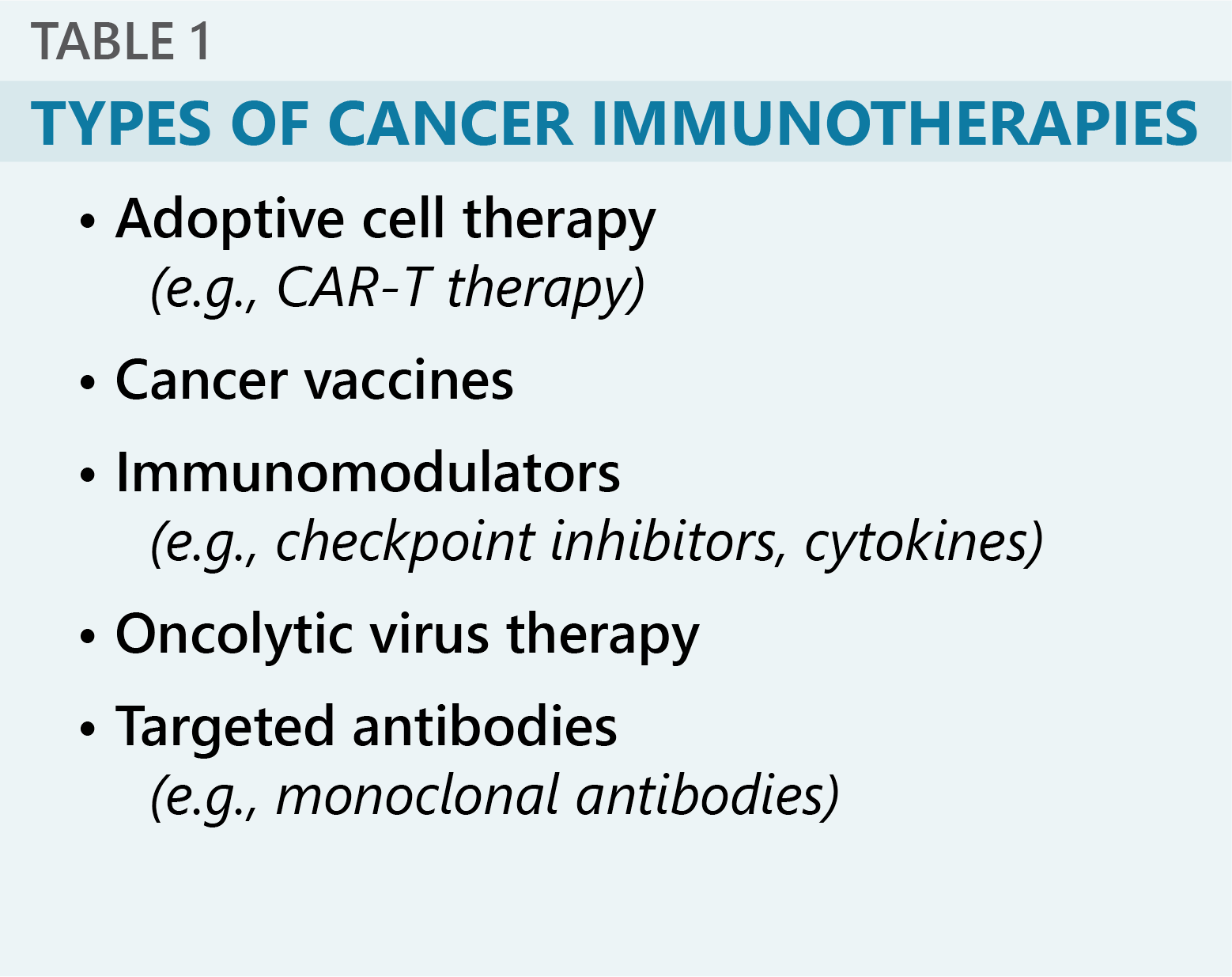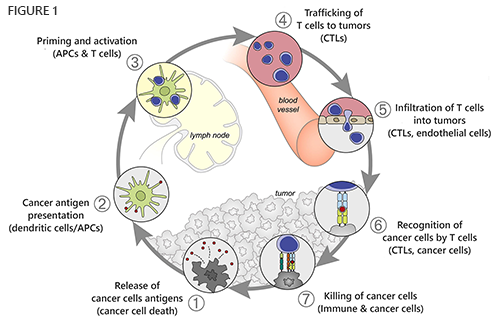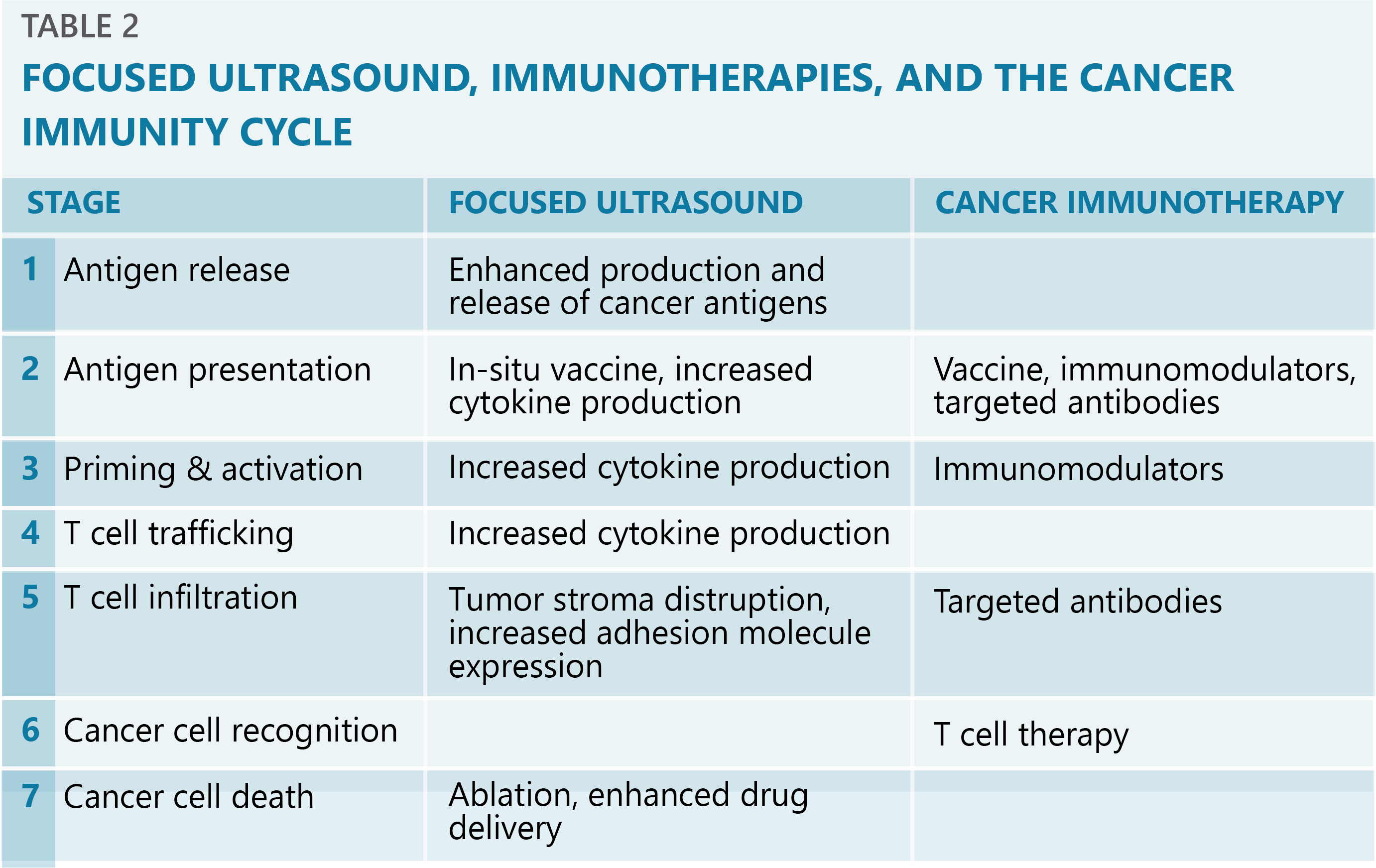 New and ongoing clinical and preclinical research is examining the use of focused ultrasound in initiating an anti-tumor immune response – either alone or in combination with immunotherapies – to treat cancer.
New and ongoing clinical and preclinical research is examining the use of focused ultrasound in initiating an anti-tumor immune response – either alone or in combination with immunotherapies – to treat cancer.
Although immunotherapy is the most promising cancer treatment of our time, it is only effective in 20 to 40 percent of patients. There are several types of immunotherapies that are either already approved by the US Food and Drug Administration or in ongoing clinical trials (see Table 1).
Focused ultrasound is a multi-functional tool that has the potential to enhance the effectiveness of cancer immunotherapy throughout the cancer immunity cycle in a variety of ways (Figure 1 and Table 2).
Clinical Trials
Two of the first US clinical trials to pair focused ultrasound with an immunotherapy drug are underway and actively recruiting patients. Both studies, taking place at the University of Virginia (UVA), are investigating the effect of focused ultrasound combined with checkpoint inhibitors. Additional clinical trials are underway in Europe and worldwide.
 One UVA study, led by Dr. Patrick Dillon, is employing focused ultrasound plus pembrolizumab (Keytruda) to treat metastatic or unresectable breast cancer. The researchers are using focused ultrasound thermal ablation to destroy 50 percent of the target tumor then evaluating the safety and efficacy of various immunotherapy dosing schedules.
One UVA study, led by Dr. Patrick Dillon, is employing focused ultrasound plus pembrolizumab (Keytruda) to treat metastatic or unresectable breast cancer. The researchers are using focused ultrasound thermal ablation to destroy 50 percent of the target tumor then evaluating the safety and efficacy of various immunotherapy dosing schedules.
The second UVA study, led by Dr. Craig Slingluff, is comparing the immune effects of focused ultrasound with or without pembrolizumab or imiquimod to treat advanced solid tumors. The team will analyze the immune response and measure any tumor regression that results from the treatment.
Another clinical trial recently began in France for patients with melanoma that has metastasized to the brain. In this study, investigators are using ultrasound to open the blood-brain barrier (BBB) immediately prior to delivering a checkpoint inhibitor. In this case, the primary goal of the ultrasound is to enhance the delivery of the immunotherapy to the brain rather than elicit an enhanced immune response, although an immune response may occur as a secondary benefit.
 There are additional clinical trials where the primary aim is to measure the immune response to focused ultrasound rather than manipulate the response. There are many trials around the world using focused ultrasound to treat cancer that provide an opportunity to obtain blood or tissue samples before and after the focused ultrasound treatment. Analysis of these samples will assess whether focused ultrasound alone induces an immune response. Focused ultrasound trials in pancreatic cancer at Stanford and Oxford, as well as liver cancer trials in Spain and at the University of Wisconsin, are also collecting patient samples for immune assessment. These trials are critical for understanding how focused ultrasound alone may affect the immune response.
There are additional clinical trials where the primary aim is to measure the immune response to focused ultrasound rather than manipulate the response. There are many trials around the world using focused ultrasound to treat cancer that provide an opportunity to obtain blood or tissue samples before and after the focused ultrasound treatment. Analysis of these samples will assess whether focused ultrasound alone induces an immune response. Focused ultrasound trials in pancreatic cancer at Stanford and Oxford, as well as liver cancer trials in Spain and at the University of Wisconsin, are also collecting patient samples for immune assessment. These trials are critical for understanding how focused ultrasound alone may affect the immune response.
Preclinical Laboratory Studies
Preclinical laboratory studies in a variety of tumor models, including melanoma, pancreatic cancer, and glioblastoma, have demonstrated that focused ultrasound can elicit a powerful anti-tumor immune response either alone or in combination with other immune-based therapies.
Many active preclinical laboratory studies involving focused ultrasound and the immune response to cancer are receiving funding from the Foundation. Projects at UVA are examining focused ultrasound immunomodulation of pancreatic cancer, breast cancer, and primary and metastatic brain tumors. At the University of Michigan, researchers are examining histotripsy-mediated immune stimulation.
A multi-site consortium orchestrated by the Foundation recently completed projects to evaluate how various modes of focused ultrasound (thermal ablation, histotripsy, BBB opening, pulsed mechanical, and others) affect the immune response and response to immunotherapy in a mouse model of glioma.
At the University of California, Davis, investigators evaluated the effect of focused ultrasound prior to immunotherapy treatment in a melanoma model. They found that focused ultrasound thermal ablation enhanced anti-tumor efficacy over immunotherapy alone by enhancing the local innate immune response and systemic adaptive response.
To see more on the state of the field, including an inventory of projects and publications, read the Foundation’s Cancer Immunotherapy Comprehensive Overview.
